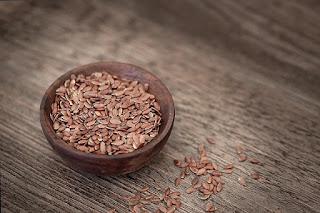Health Benefits of Flax Seeds
 |
| Health Benefits of Flax Seeds
Image by PeziBear on Pixabay
|
Healthy Food - Health Benefits of Flax Seeds
Flax Seeds are considered in category of "super food”
now a days. Scientific research also points to their health benefits. Scientific
name for Flax Seeds is Linum Usitatissium which means most useful.
Flax seeds are one of oldest crops. There are two types brown and golden. Both
are equally nutritious. Below are Health Benefits of Flax Seeds.
Flax Seeds are Packed with Nutrients
Flax seeds are good source of many nutrients. Their health
benefits are due to content of omega-3 fats, lignans and fiber in them. One tablespoon
of ground flax seeds provides good amount of protein, fiber and omega-3 fatty
acids. They are rich source of some vitamins and minerals.
Flax Seeds for Heart
Flax seeds are rich source of omega-3 fatty acid ALA (alpha-linolenic
acid) which is plant based. ALA fatty acids are beneficial for heart and
lower risk of stroke.
Flax Seeds for Cancer
Flax seeds contain lignans nutrients which have powerful
antioxidant and estrogen properties. They may aid in preventing breast cancer,
prostate cancer as well as other types of cancer.
Flax Seeds for Digestive Health
3 grams of fiber are present in One tablespoon of flax seeds.
It is equal to 8-12% of daily recommended intake for men and women. It contains
two types of dietary fibre solube 20-40% and insoluble 60-80%. Flax seeds are
fiber packed. Adding flax seeds to our diet promotes regular bowel movements
and improve our digestive health.
Flax Seeds for Cholesterol
Flax seeds contain high fiber content which can help lower
cholesterol. It may play an important role in improving heart health.
Flax Seeds for Blood Pressure
Flax seeds have been proven to lower blood pressure and are
helpful especially for those with high blood pressure.
Flax Seeds for Veggies
Flax seeds can be an alternative protein source for people
who do not eat meat as they are good source of plant-based protein.
Flax Seeds for Diabetes
Flax seeds contain insoluble fiber content which may lower
blood sugar. Adding flax seeds to diet of people with diabetes can be
beneficial to them.
Flax Seeds for Weight Management
Flax seeds can keep us full for longer time and help us
manage weight by controlling appetite. Soluble fiber content of flax seeds gives
a feeling of reduced hunger. It slows down digestion in stomach which activates a host of hormones that control appetite and provide a feeling of fullness.
Nutrition in Flax Seeds
One tablespoon of ground flax seeds contains:
Calorie : 37
Protein : 1.3 grams
Carbs : 2 grams
Fiber : 1.9 grams
Total Fat : 3 grams
Saturated Fat : 0.3 grams
Monounsaturated Fat : 0.5 grams
Polyunsaturated Fat : 2.0 grams
Omega-3 fatty acids : 1597 mg
Vitamin B1 : 8% of RDI
Vitamin B6 : 2% of RDI
Folate : 2% of RDI
Calcium : 2% of RDI
Iron : 2% of RDI
Magnesium : 7% of RDI
Phosphorus : 4% of RDI
Potassium : 2% of RDI
How to add Flax Seeds to Diet
Flax seeds can be added to daily diet easily. Flax seeds or
flaxseed oil can be added to common foods like:
·
Add them to water and drink it as a part of
daily fluid intake
·
Sprinkle flax seed oil as a dressing on salad
·
Sprinkle ground flax seeds over hot or cold
breakfast cereal
·
Mix them into yogurt
·
Add them into cookie, muffin, bread or other
batters or dough
·
Mix them into smoothies to thicken up
How to Consume Flax Seeds
Ground flax seeds are easier to digest than whole ones.
Intestines cannot break down tough outer shell of seeds.
Buy whole flax seeds, grind them and store them in an
airtight container.
Flaxseed Oil
Flaxseed oil is sensitive to heat and light. It is best to
keep it in dark glass bottles. Store it in a dark, cool place like a kitchen
cabinet. It is extracted by cold pressing process.
Flaxseed oil is not suitable for high temperature cooking as
some of its nutrients are heat sensitive. Some studies show that light stir-
frying using flaxseed oil up to 350°F/177°C did not cause any reduction in
quality of oil.
Flax seeds oil contains more ALA than flax seeds. One
tablespoon of ground flax seeds contains 1.6 grams ALA while one tablespoon of
flaxseed oil contains 7 grams.
Flax seeds contain other beneficial nutrients such as fiber
which are not available in flaxseed oil.
To fully obtain health benefits of flax seeds, ground flax
seeds are better choice.
Daily Consumption of Flax Seeds
It is recommended to keep serving sizes of flax seeds to less than 5
tablespoons (50grams) per day.
Studies have noted health benefits with just 1 tablespoon
(10grams) of ground flax seeds per day.
Tiny Flax seeds are rich in omega-3 fatty acid ALA, lignans
and fiber, all of which have many potential health benefits. They can improve
digestive health, lower blood pressure and bad cholesterol, reduce risk of cancer
and may benefit people with diabetes.
Flax seeds or flaxseed oil are versatile food ingredient and
easy to add to diet.
Let us add flax seeds to our diet and see the benefits.
Also Read: Nature Cure - Daily Menu for Health
Also Read: Nature Cure - Daily Menu for Health



I’m genuinely impressed with your knowledge. You have shared good knowledge by this blog. It was a really attractive blog. Please keep sharing your post with us.curries near me.
ReplyDelete